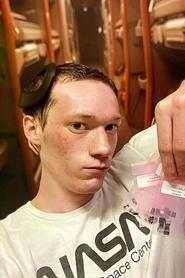
Ask Your Own Question
What is the plot?
Mia Akerlund, a new student at the university, is still adjusting to her surroundings and the competitive atmosphere of the biohacking community. In this episode, she is determined to uncover the truth about her brother's mysterious death, which she believes is linked to the experiments conducted by the renowned scientist, Dr. Tanja Lorenz. Mia's internal conflict is palpable as she grapples with her desire for revenge and her need to fit in with her peers.
Mia attends a lecture by Dr. Lorenz, where she is captivated by the professor's charisma and groundbreaking research on genetic engineering. After the lecture, Mia approaches Dr. Lorenz, hoping to gain insight into her brother's case. However, Dr. Lorenz is dismissive and enigmatic, leaving Mia frustrated and more determined to dig deeper into her brother's past.
Later, Mia meets her roommate, the eccentric and tech-savvy Niklas, who becomes an ally in her quest for answers. They bond over their shared interest in biohacking, and Niklas introduces Mia to the underground biohacking community. This new world is filled with experimental procedures and ethical dilemmas, which both intrigue and unsettle Mia.
As Mia delves deeper, she discovers a hidden lab where students conduct unauthorized experiments. Here, she witnesses a shocking demonstration of a biohacking procedure that enhances physical abilities. The atmosphere is charged with excitement and danger, and Mia feels a mix of awe and fear. She realizes that the lengths to which her peers will go for scientific advancement are extreme.
Mia's investigation leads her to a confrontation with a fellow student, who reveals that Dr. Lorenz was involved in unethical experiments that may have contributed to her brother's death. This revelation intensifies Mia's resolve to expose the truth. She begins to gather evidence, but her actions attract the attention of Dr. Lorenz, who becomes suspicious of Mia's motives.
In a tense scene, Mia sneaks into Dr. Lorenz's office to search for incriminating documents. As she rummages through the files, she is caught by Dr. Lorenz, leading to a heated exchange. Dr. Lorenz confronts Mia about her intentions, and Mia, fueled by anger and desperation, accuses her of being responsible for her brother's death. The confrontation is emotionally charged, with Mia's grief and rage clashing against Dr. Lorenz's cold demeanor.
After the confrontation, Mia feels a mix of fear and determination. She realizes that she is in over her head but is unwilling to back down. She confides in Niklas about her findings, and they devise a plan to gather more evidence against Dr. Lorenz. Their bond strengthens as they navigate the moral complexities of biohacking together.
The episode culminates in a dramatic twist when Mia receives an anonymous message containing a video that appears to show her brother's last moments before his death. The video reveals shocking details about the experiments he was involved in, deepening Mia's resolve to seek justice. The episode ends with Mia staring at the screen, her emotions a whirlwind of anger, sadness, and determination as she prepares to confront the dark truths of the biohacking world.
Related Titles
Browse All Titles →What is the ending?
Is there a post-credit scene?
How does the episode explore the theme of trust among the characters?
Trust is a central theme in this episode, as Mia struggles to determine who she can rely on. Her growing suspicion of her classmates, particularly regarding their knowledge of her past and their own experiments, creates a tense atmosphere where alliances are tested and secrets threaten to unravel their relationships.
How does Mia's relationship with her classmates evolve in this episode?
Mia's relationship with her classmates becomes increasingly complex as she navigates trust and betrayal. She finds herself at odds with her roommate, who is suspicious of Mia's intentions, while also forming a tentative bond with a fellow student, who shares her interest in biohacking.
What secrets does Mia uncover about her past in this episode?
In this episode, Mia delves deeper into her family's history, particularly focusing on her father's involvement in controversial genetic research. She discovers that her father was part of a project that aimed to enhance human capabilities through biohacking, which ultimately led to tragic consequences.
What role does the character of Jasper play in Mia's journey during this episode?
Jasper serves as both a mentor and a potential threat to Mia. He introduces her to the underground world of biohacking, but his motivations are ambiguous, leaving Mia to question whether he is genuinely helping her or using her for his own agenda.
What ethical dilemmas are presented through the experiments conducted by the students?
The episode showcases various experiments that the students conduct, raising ethical questions about the limits of biohacking. Mia grapples with the morality of manipulating genetic material, especially when she witnesses the potential harm it can cause to living organisms.
Is this family friendly?
"Biohackers" Season 1, Episode 2 titled "Secrets" contains several elements that may not be suitable for children or sensitive viewers. Here are some potentially objectionable aspects:
-
Medical Experiments: The episode features scenes involving genetic manipulation and medical experiments, which may be unsettling for younger audiences.
-
Ethical Dilemmas: There are discussions and situations that raise ethical questions about science and morality, which could be confusing or distressing for children.
-
Tension and Suspense: The episode builds tension through various confrontations and secrets, which may create a sense of anxiety.
-
Mature Themes: Themes of betrayal, ambition, and the consequences of scientific exploration are prevalent, which may be more suitable for older viewers.
-
Emotional Conflict: Characters experience intense emotional struggles, including fear and desperation, which could be upsetting for sensitive viewers.
These elements contribute to a narrative that may not be appropriate for all audiences, particularly younger children.




















